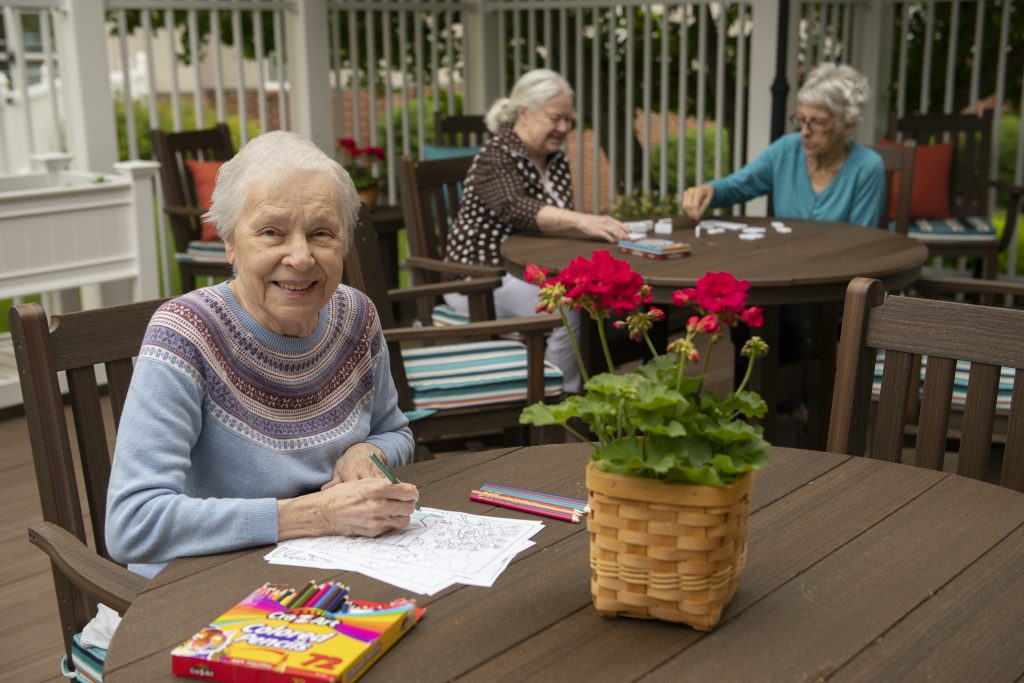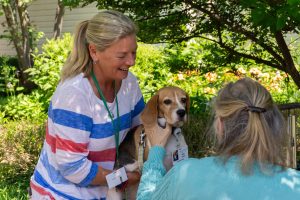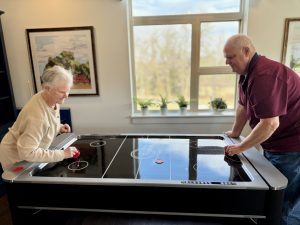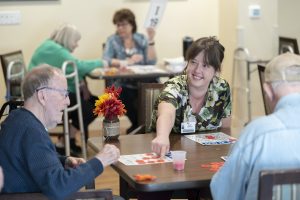Thanks for the Memories
When it's time for senior memory care, help is there

My father had Alzheimer’s disease for 18 years. For a long time, he and my mother managed his slipping memory — forgetting tasks or friends’ names. For a while, he skillfully covered up memory lapses with humor. Songs he’d known much of his life — for example, tune and lyrics to “Found a Peanut”— would sometimes spark memories that brought him back to us to share stories of dating Mom long before she was our mother.
But there came the days when he didn’t remember where he lived, whether he was a retired adult or schoolchild, or who we were.
Eventually, he was left with emotion and motion. Even the rosiest of sunsets sometimes brought on his blues, a deep despair. A few times he believed he was living his fears of 1944. We still had some wonderful moments together on walks or sipping iced mochas, but those moments were fleeting.
We were not alone. Families of nearly 7 million people in the United States live a similar scenario. In Pennsylvania, 11.5% of adults over the age of 65 are living with Alzheimer’s disease or similar symptoms.
Fortunately, there are senior-care communities with programs designated to help loved ones with memory loss. And it’s okay to ask for help.
“Ah Yes, I Remember It Well.”
Magnolia Crossing is a special “neighborhood” inside the main building at Granite Farms Estates. Almost two years old, it has a separate room for each senior.
Digital photo frames hang outside each resident’s door. Part of reminiscent therapy, photos of what matters to the individual tap into different parts of the brain where wonderful memories are stored. A photo of her loving family helps a senior find her room. A picture of his first puppy or prized rosebush helps spark conversation and facilitates rapport among resident, visitors and staff.
Inside, rooms hold individuals’ belongings to keep what is familiar at hand. As with other assisted living programs within the Acts-Life Communities, memory care is as personalized as possible to make engagement meaningful. What is known and remembered provides comfort and security beyond 24/7 supervision, assistance with activities of daily living, cognitive stimulation and familiar routines.

Another piece of Magnolia’s reminiscent therapy and a feature of Barclay Friends’ new Goshen Memory Care, which opened this April, looks and feels like fun and games. At a Tovertafel — an interactive, multi-sensory technological “magic table”— seniors gather for activities based on images and light projected onto a tabletop.
Through motion sensors, those images respond to hand movements. (Imagine “Star Trek: The Next Generation’s” Holodeck on a table.) A woman laughs and reminisces with her tablemates about autumn hikes as they pick up real tiny rakes and “move” projected fall leaves to uncover images of ladybugs. Many of the games are based on music, such as music-box melodies of a virtual old-time jewelry box with a twirling ballerina. A side benefit of the magic is the eager participation of grandchildren.
By Design
Two four-pawed playmates make a special difference at Tel Hai’s Lakehouse Memory Support. Soft, furry robotic pets designed for people with Alzheimer’s and dementia can purr, meow and mimic real cats’ movements. Wonderful for petting and comfort, they can help relieve loneliness and agitation. But forgetting to feed them is never a problem. Even better, they don’t need a litterbox. Tel Hai’s cozy library — home to the cats and calm space for residents to destress or regulate their emotions — also holds a curated collection of puzzles and books for those with Alzheimer’s.

The memory care program at Fieldstone at Chester Springs uses other evidence-based practices to reduce agitation and anxiety as part of a safe, secure environment. Staff serve favorite foods with balanced nutrition on brightly colored plates, while paying attention to mealtime verbal and nonverbal communication. Programs and events are geared to residents’ specific interests — karaoke bus rides and seated disco dances.
Loss of hearing, eyesight and strength add another layer of complexity to memory problems, including risk for falls. Inside and outside of residential programs, with or without dementia, falls tend to be the top reason for elders’ emergency room visits. And unfamiliar hospital rooms and routines can increase seniors’ confusion. So Fieldstone offers A Matter of Balance programs. The small-group activities, exercise, problem-solving and planning reduce risks of falls and ensuing trips to the ER.
Helping the Helpers

Tel Hai’s Lakehouse Memory Support Team offers professional experience and therapeutic programs for loved ones caring for someone with dementia, as well as residential care for the senior. Their facilitated Care Partner Support Group gives participants a safe place to share stories, ask questions, express frustrations, explore strategies for managing dementia-related behaviors and rediscover laughter with peers.
Patty Winstead, a memory care marketing consultant with years of compassionate experience in the field, offers an Alzheimer’s caregiver support group at Chester County’s Hankin Library and started one at Fieldstone this fall.
Tips to Help a Friend with Alzheimer’s
Whether a dear one is moving to a memory care unit or still in your care, tips from experts can make your time together a little easier and more meaningful. Here are some suggestions.
- Family members and friends can provide photos, small belongings, playlists of cherished music and information about favorite activities, memories and routines to maintain as much comfortable familiarity as possible.
- Keep questions and choices simple, suggested Winstead. Offer one or two options, then give them time to let questions process and then to formulate a reply. That reply might take 30 seconds, which may feel like a long time, but it’s worth it.
- Singing the recognizable happy birthday song can create a light-hearted feeling to kick off smiles and conversation. If the family is agitated, interactions will be harder for everyone.
- Many communities establish a consistent routine, create a calm environment, soft music and gentle touch to help seniors with the turmoil of “sundowning syndrome” — confusion, anxiety and agitation that occurs in the late afternoon and lasts into the night.
- Make time for sunlight and fresh air. Tel Hai residents enjoy a secure outdoor porch. Barclay Friends’ courtyard path meanders under an arbor, past gardens and benches for resting among birds and butterflies, and a patio where plenty of people gather for conversation, yet loops back to its start so no one gets lost.
- When making hard decisions, be gentle on yourself. It’s hard to say goodbye to someone who isn’t like they once were. When considering help, take into account that with other care, a spouse or partner can return to being a spouse instead of acting as 24/7 caregiver. A grown child can be a loving offspring instead of an aide managing household duties. A partner can focus on loving moments instead of vigilance to ensure a loved one doesn’t wander from home.
Hear Like a Bat, Remember Like an Elephant
Research from Johns Hopkins University has established links between hearing loss and cognitive and memory decline. According to the Alzheimer’s Society’s website, “Hearing loss has also been shown to be linked to quicker shrinkage of areas of the brain responsible for processing sounds and memories.”
Simply put, for older adults, hearing loss can cause cognitive overload, limit conversations and stimulation, and create isolation, which can lead to dementia.
“Get your loved one’s hearing tested for decline and how the brain is processing speech,” said Brooke Craig, Au.D., at Aberdeen Audiology. Some older adults aren’t aware that some insurance plans are starting to cover or discount the cost of hearing aids, or provide information about accessibility to aids. Some supplemental plans to Medicare and AARP have discounts. Don’t let concern over price prevent you from making an appointment!
If you already have a hearing aid, consider the audiologist’s tips for seniors to hear better or utilize hearing devices better:
- First, wear them — don’t leave them on the shelf.
- Continue follow-up care. Take advantage of aural rehabilitation courses to make the most of hearing aids.
- Clean devices with tools provided by the audiologist.
- Understand how to use aids in a restaurant or church. Audiologists can help select the best technological device based on clients’ typical environments (attending meetings, eating with large groups or leading a quiet life).
- Find out how your senior life community helps with hearing aids. Some have monthly audiologist visits. Some hold hearing aids in recharging units at the nurses’ station overnight. Some add assistance with battery checks and changes along with ear insertion to care plans. Others rely on adult children to take a parent to an audiologist’s office to clean hearing aids or remove ear wax from a parent’s ears.
While Beethoven composed music for decades with a deteriorating hearing loss — even trying an ear trumpet to no avail — today we have access to hearing aids and other modern treatments that can work wonders. Get your hearing checked at your next medical appointment … and create your own ode to joy.
A Safer Home
What changes in the home can caregivers make to support loved ones with memory loss? Here are a few adjustments to help create a safer environment in familiar surroundings and reduce daily stress for both of you.
- Label, Label, Label. Clearly label drawers, closets, rooms and other things with large-print signs (e.g., “Snacks,” “Clothes,” “Toilet”) to make daily tasks easier.
- Simplify. Reduce clutter and keep items that are used often in the same spot. Predictability and routine can reduce anxiety.
- Lights Up. Install motion-activated night lights in bedrooms, hallways and bathrooms to help prevent falls in the night.
- Smart Safety. Consider installing “smart” features, like automatic shut-off devices for stoves, smart plugs for appliances and door alarms or safety latches to help prevent wandering.
- Info Central. Designate one spot — a bulletin board or the fridge door — for posting a daily routine along with all appointments, medication reminders and notes.
- Helpful Tech. Use voice assistants, like Alexa or Google Home, for medication reminders and to answer simple questions. These devices can also play familiar music upon request!
- Spark Joy. Put family photos and favorite keepsakes in places they can be seen. Familiar items offer emotional grounding and happy memories.
Alzheimer’s and dementia are hard on the person with it and the people who love them. But as I learned with my dad, with help there are moments remembering beautiful memories and creating new ones.
